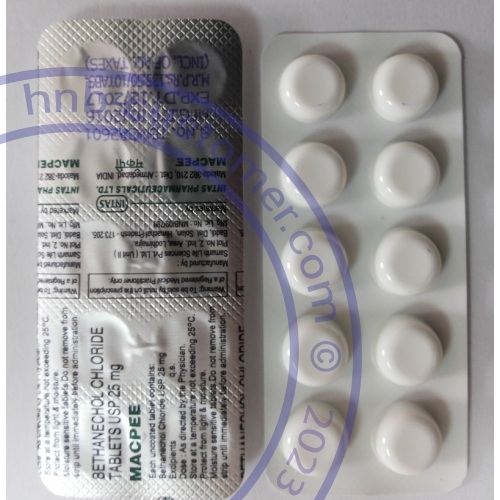

Brand(s):
- Urivoid Macpee
Manufacturer:
- Cipla Limited / Intas Pharmaceuticals Ltd
Disease(s):
- Urinary Retention / Difficulty Urinating
- We can ship our products to any location worldwide
- Enjoy complete anonymity and robust data security measures
- Exclusive certified products at compelling prices
- Skip the hassle of long queues; get your medicines hassle-free
Urecholine
bethanechol


Brand(s):
- Urivoid Macpee
Manufacturer:
- Cipla Limited / Intas Pharmaceuticals Ltd
Disease(s):
- Urinary Retention / Difficulty Urinating
Bethanechol Tablet
What is Bethanechol?
Bethanechol is a medication that stimulates the bladder to help it empty. It's a cholinergic drug, meaning it works by activating the parasympathetic nervous system. This system controls involuntary bodily functions, including bladder function.
Doctors primarily prescribe bethanechol to treat urinary retention, a condition where the bladder doesn't empty properly. This can happen after surgery, childbirth, or due to various other medical conditions. It's also sometimes used off-label for other purposes.
Important Information About Bethanechol
To minimize nausea and vomiting, take bethanechol on an empty stomach, at least one hour before or two hours after meals.
Bethanechol can cause dizziness or even fainting, particularly when standing up from a sitting or lying position. Get up slowly to avoid falls and injuries.
Exercise caution when driving, operating machinery, or engaging in other activities that require alertness. Dizziness is a potential side effect, and if you experience it, avoid these activities.
Talk to Your Doctor Before Taking Bethanechol
Before starting bethanechol, inform your doctor if you:
Have uncontrolled hyperthyroidism (overactive thyroid).
Have stomach ulcers.
Have asthma.
Have recently undergone bladder or intestinal surgery.
Have a blockage in your intestinal tract.
Have a slow heart rate or low blood pressure.
Have coronary artery disease (blockages in the heart's arteries).
Have epilepsy or another seizure disorder.
Have Parkinson's disease.
Depending on your health conditions, your doctor might adjust your dosage or recommend additional monitoring during treatment.
Bethanechol falls under FDA pregnancy category C. This means the potential risks to an unborn baby are unknown. Pregnant women should consult their doctor before taking this medication.
It's unclear whether bethanechol passes into breast milk. Nursing mothers should also discuss this with their doctor before using bethanechol.
How to Take Bethanechol
Follow your doctor's instructions precisely. If you're unsure about anything, seek clarification from your doctor, nurse, or pharmacist.
Take each dose with a full glass of water. Remember to take it on an empty stomach, as previously mentioned.
Store bethanechol at room temperature, away from excessive heat and moisture.
Missed Dose
Take the missed dose as soon as you remember, unless it's almost time for your next scheduled dose. In that case, skip the missed dose and continue with your regular schedule. Never double the dose.
Overdose
Seek immediate medical attention if you suspect an overdose. Symptoms can include abdominal discomfort, increased salivation, flushing, sweating, nausea, and vomiting.
Things to Avoid While Taking Bethanechol
Because of the risk of dizziness and fainting, especially upon standing, rise slowly from a sitting or lying position. Avoid driving, operating machinery, or other hazardous activities if you experience dizziness.
Bethanechol Side Effects
Stop taking bethanechol and seek immediate medical help if you experience any of these serious side effects:
Allergic reaction (difficulty breathing, throat closing, swelling of lips, tongue, or face, hives).
Shortness of breath, wheezing, or chest tightness.
Less serious side effects are more common. Continue taking the medication and talk to your doctor if you experience:
Dizziness or drowsiness.
Headache.
Nausea, vomiting, diarrhea, or abdominal discomfort.
Slow heartbeats followed by rapid heartbeats.
Flushing or warmth in the face.
Sweating.
Watery eyes.
Report any unusual or bothersome side effects to your doctor. You can also report side effects to the FDA.
Drug Interactions
Before starting bethanechol, tell your doctor if you are taking any of the following medications:
Donepezil (Aricept).
Tacrine (Cognex).
Quinidine (Cardioquin, and others).
Procainamide (Pronestyl, Procan SR).
These medications may interact with bethanechol, requiring dosage adjustments or special monitoring. Other medications may also interact, so talk to your doctor and pharmacist before taking any new prescription or over-the-counter drugs.
Keep bethanechol and all medications out of reach of children. Never share your medications with others, and only use this medicine as prescribed.
```









